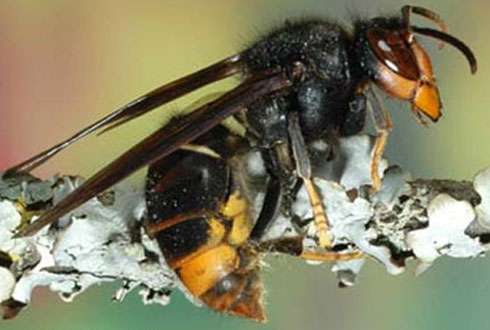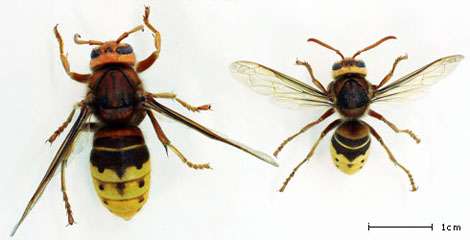Asian hornet hasn't yet spread from France to the UK

Vespa velutina, the Asian hornet, arrived in France around 2005 and has since spread throughout the north of the country. It has not yet been spotted in the UK.
The Muséum National d'Histoire Naturelle de Paris has been monitoring the movement of the non-native Asian hornet since it arrived in France 10 years ago from China, probably through the port of Bordeaux.
Continental traveler
So far, it has been recorded in western and northern France and has reportedly reached Belgium.
'This means at the moment it would still have a long crossing to reach the UK,' said Natural History Museum Hymenoptera curator Dr Gavin Broad. 'However, if it can survive a Belgian winter, it would survive in the UK. And once it moves up through France, the short hop over the Channel is no barrier, so we may well see it here in a year or so.'
Unwelcome guest
The problem of the potential arrival of Asian hornets is not the danger to people, but the impact of a non-native species on the environment, such as preying on or usurping native species from their habitat, as happened with the grey squirrel and more recently ring-necked parakeets.
'The sting of an Asian hornet is probably no worse than the sting from our native hornets, Vespa crabro,' Dr Broad said. 'For most people, it hurts when you're stung, throbs for a few hours and then dies down.

'Hornets do inject venom, however, so it you're allergic to wasp stings, your reaction would probably be similar and likewise treatable with antihistamine.'
You're probably more likely to be stung by a common wasp than a native hornet in this country because there are far more common wasps than hornets.
Including the hornet, there are around 10 species of paper wasps, the common and German wasps being the most prolific. Wasps and hornets are closely related, both from the insect order Hymenoptera, but hornets are bigger.
They are predators of gardens pests, such as caterpillars and aphids, which they feed to their young. The queen, which can grow to just over 3cm, hibernates over the winter and starts a new nest in the spring.
Wasp versus hornet
According to Dr Broad, people will often mistake the median wasp, Dolichovespula media, the largest of the non-hornet wasps, for a hornet. Wasps and hornets look similar but a hornet has a fat head, bulging behind the eyes when looking from above, and other minor differences. Wasp and hornet behaviour is similar but they maintain their colonies differently.
Hornet nests are mostly restricted to hollows in trees, whereas wasps are more versatile. One common wasp colony can produce more than ten thousand workers during the summer, whereas hornet colonies are smaller, producing little more than a thousand hornets.
Native hornets also tend to live unobtrusively and are generally quite docile.
Asian hornets are very distinctive since they are very dark brown, almost black, with narrow stripes. They are smaller than native hornets.
The detrimental impact of an influx of Asian hornets would unfortunately be on honey bees because V. velutina is a specialised predator of bees, attacking worker bees, chopping them up and feeding them to its larvae. Native hornets do not habitually feed on bees.
Because of the threat to bees, Defra (the Department for Environment, Food and Rural Affairs) has plans to control Asian hornets if they are identified in the UK. The most effective way to prevent the spread of invasive species is eradication at the initial stage.
The Museum will continue to work with other organisations to monitor the spread of Asian hornets and through the Museum's Identification and Advisory Service (IAS). The most useful form of identification for anyone concerned about a hornet is a good photo from above.
'Similar to wasps nests, however, I wouldn't advise interfering with or attacking any type of hornets nest, nor trying to kill one because of the risk of getting stung,' Dr Broad said.
Provided by Natural History Museum



















